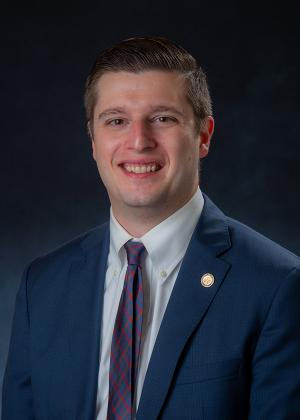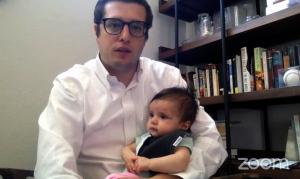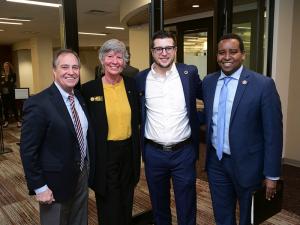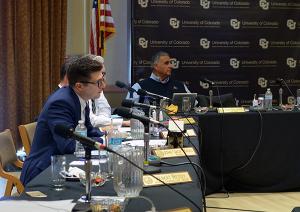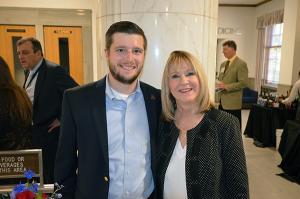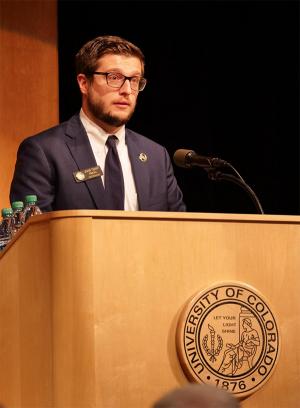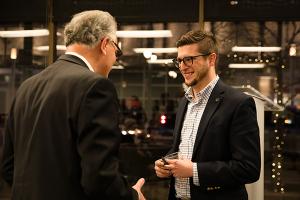Five questions for Regent Jack Kroll
John “Jack” Kroll has served on the CU Board of Regents for over four years, but he’ll lead the governing body as newly elected board chair when members gather next week for their annual summer retreat. The multi-day meeting in Tabernash will be the board’s first in-person event since before the coronavirus pandemic.
Among those joining him for the retreat is another longtime CU leader who also is in a new role: President Todd Saliman, whose interim stint began last week.
“I’m looking forward to reengaging in person with my board colleagues, as well as with Todd Saliman and his team,” Kroll said. “There are a lot of important issues to address, but there is also a lot of collective energy from the board and administration to address them.”
Kroll noted that Saliman was elected the 24th president of the University of Colorado on a 9-0 vote by the Board of Regents.
“So this next year is going to be a lot of fun as the board and he, the chancellors and their teams work together,” Kroll said. “Todd brings a tremendous amount of acumen with respect to the budget, internal operations and our external relations with lawmakers. He bleeds black and gold. He’ll be a champion for CU and all who care about it without question. The Board of Regents and Todd will help us find common ground as we emerge from the pandemic, navigate a return to campus for many, run a presidential search, and tackle yet unknown challenges.
“Having known Todd for some time, I know he’s a leader who knows how to work with people, find common ground and move an organization forward. He’s the right person for this time in CU’s history.”
Voters in Colorado’s 1st Congressional District elected Kroll, a Denver Democrat, to the board in 2016. His CU ties run much deeper, though, as he is a CU Denver alumnus (bachelor’s and master’s degrees), former student governance leader and current associate director of admissions at CU Boulder. At 33, he also is one of the youngest chairs in board history. Now he looks ahead to the search for CU’s next systemwide leader with a new level of energy and enthusiasm as chair.
1. What progress has the Board of Regents made on the presidential search and what are your immediate next steps?
We’ve made very good progress on the search so far. We’ve begun our review of policy 3.C., which governs how we conduct searches. We determined the search will be national in scope while understanding that there are talented and capable people in Colorado. In conjunction with the President’s Office, we are planning a series of outreach trips statewide and across our campuses to solicit feedback on the state of the university, the presidential search process and take input on what the community expects to see in our next president.
While the board has been at work since May setting the stage for the search, much of the public phase of the work will start in earnest at the outset of the fall term. Our updated search policies will be finalized and we can then move deliberately to name a search committee. From there, we expect the search committee to be collaborative, efficient and successful in producing a well-vetted slate of candidates for the board to review. We are committed to regular communication with the university community and to transparency, understanding there will be moments during the search when we will have to balance that with confidentiality for candidates. We believe we can strike that balance.
2. What are the primary issues the Board of Regents will address at its retreat next week and what are the board’s priorities as we head toward fall?
Regent Lesley Smith and the Governance Committee from 2020-2021 planned a great retreat. Front and center on our agenda will be the presidential search and an update on the strategic plan and particularly its focus on Diversity, Equity and Inclusion.
It will also be very important for board members to get to spend time together. Like nearly everyone else at CU, we’ve been predominately remote since March of last year. Add to that the fact that three new regents started with us in January. Given this, it’s my hope we spend a lot of time getting to know one another and reacquainting ourselves with how to do our work in-person.
Speaking of in-person, the university has got to get back to being in-person in a way that is safe, productive and enjoyable. But we just can’t simply go back to the way things were. We’ve learned a lot over the last year about what remote work/teaching/learning/researching can do and cannot do. Let’s keep the good from remote world, while returning to what we know works best in-person.
We’ve also got to make advancements in ensuring CU is a welcoming place for all. The pandemic disproportionately affected our most disadvantaged students, and before the pandemic we had much work to do in that space. That work has only gotten more challenging. We must redouble our efforts moving forward to ensure CU lives up to its ideals and potential with respect to diversity, equity and inclusion.
We’ve also got to plan for a future that is sustainable. Higher education, like most enterprises, has received significant support from one-time stimulus dollars, but our underlying budget realities show little sign of changing. While we are grateful for the increase in state funding this year, long-term trends are not in our favor; and despite the work of the Legislature and governor, higher education in Colorado is still ranked 47th nationally in state support. State funding per resident student at CU is about 50% below what it was in 2000, when adjusted for inflation. Before COVID, the university had not recovered the state support, in inflation-adjusted terms, it received before the Great Recession and financial crisis of 2008-2009. And while state budgets and university budgets are buoyed by one-time federal dollars, those will run out sooner rather than later and we’ll need to have a plan.
3. The Board of Regents has a Democrat majority for the first time in decades. What will the implications be for how it works together and for the university?
While much has been made about the board’s political makeup, I think it’s important to note we agree much more than we disagree on what’s best for the university and we vote accordingly. Likely, the most important vote the board will hold during my time as chair will be the vote to name our 25th president. It’s my obligation as chair to get enough of my colleagues to see that the board, and therefore, the public, will be best served by having a president that a significant majority of the board supports. It doesn’t need to be 9-0, like with Todd, but it should be close to that. Every regent I have served with, and those I have talked with who served before us, wants to make the university better than when we found it. So, I have hope we can move forward on this not as Democrats and Republicans, but as champions for CU. I have seen this happen on many issues and I am confident that will be the case here.
Early in my career, I nearly left CU for a master’s program at the University of Texas Austin. That famed university is home to LBJ’s presidential library. Just inside the lobby there is a large granite stone engraved with a quote from America’s 36th president that offers advice to all of us in elected office at every level of our democracy – advice I hope we as regents can adopt moving forward. That quote is, “I have followed the personal philosophy that I am a free man, an American, a public servant, and a member of my party, in that order always and only.”
4. You have a multifaceted perspective as a regent, chair of the board, alumnus of CU and university employee (one of three on the board). Does that combination provide you any particular perspective in your board work?
I have been fortunate to learn many things since starting my CU journey as an 18-year-old undergraduate student in the fall of 2006. In the 15 years since, I have traveled the state, nation and parts of the world promoting CU as a student leader, admissions recruiter and regent. There is so much potential at CU in our students, our staff and our faculty. What we do here makes the world a better place and we do our work one student at a time, one research project at a time, one patient at a time. The cumulative effect of it all is mind-boggling and beautiful.
And while there are so many life-changing and wonderful things that happen at CU and because of CU, it’s also important to note it’s a huge, far-flung and complicated enterprise. Because of its size and complexity, some want to believe the worst and see conspiracy at every turn. But in a place where responsibility is usually shared but authority isn’t always clear cut, it’s important to figure out how to work with other people and build consensus. It’s also important to remember all universities exists in large measure to challenge conventional thinking. You must get folks on board through persistence and the clarity of your idea.
5. You are a noted baseball aficionado. Does that passion translate to your university life at all and what are we going to do with the state of the Colorado Rockies?
In my personal life, I am a huge sports fan, mostly baseball. I’ve been lucky to see major-league games at 27 of the 30 major-league cities. I just have Atlanta, Tampa and Toronto to see games at before I can say I’ve done all 30 stadiums.
Baseball is a game where failure is ever-present. Even the most successful players are often unsuccessful 60%-70% of the time. The former Rockies manager Clint Hurdle adopted the saying that there are two types of players in baseball, “those who are humble and those who are about to be humbled.” You can easily expand that idea to life at a university and life in general.
Many research projects fail to reach any novel conclusions or are simply unrepeatable/inconsistent. Even the best high school graduates, transfer students and graduate students who come to CU are humbled by the challenges they face on our campuses. Our top physicians are constantly confounded by new diseases. But through all of those challenges, the university continues to persist and push forward. We have our fair share of strikeouts, but we also hit a lot of home runs interspersed among solid singles and several extra-base hits. And we are constantly refining our skills and talents to be ready for our next opportunity, our next at-bat, to make an impact.
As for the Rockies ... there’s always next year and hope springs eternal.


